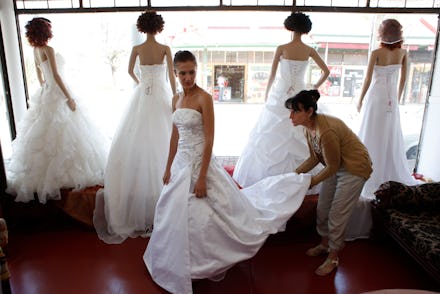Keeping Your Maiden Name Isn't Revolutionary

My full legal name, as it reads on my birth certificate, is Krystie Lee Yandoli. Yandoli is my father's last name (which everyone in my family shares), Lee was apparently inspired by his favorite Yankees catcher Thurman "Lee" Munson, and Krystie was just a name that both my mom and dad liked.
Despite the fact that my parents decided to give me a simple first name with an uncommon and difficult spelling, I like my name. It's a big part of my identity, and not just because it's representative of who I've been for the past 23 years. It's also my byline. "Krystie Lee Yandoli" is what appears on everything I write, and I've never intended on changing that.
Names obviously define us as individuals, but they also define us collectively, like when two people get married.
In a recent survey, 63% of male Men's Health readers said they would be unhappy if their wives decided to keep their maiden names, and 96% of said that if asked, they wouldn't oblige their partner in taking her last name. Another survey conducted by the Huffington Post/YouGov confirms this cultural status quo, with 61% of saying women should take their husband's last name. When it comes to hyphenating, 39% of Huff Po respondents thought it's "a good way [for couples] to show they respect each other," while 38% said hyphenation is "a silly piece of political correctness."
It's clear that the majority of married couples want to be defined in union by sharing the same last name. Forheterosexual couples, this usually means taking the man's last name. What the mere 8% of women who keep their own last names to preserve their sense of self and individuality may not realize, however, is that they're still a part of the patriarchal system of naming.
When women keep their names after marriage, it allows them to hold on to who they are, and who they've been their whole lives until their wedding days. It's one way to exhibit agency and maintain one's original identity.
But is your name ever really your own, or will it forever be a symbol of someone else's oppression?
In May 1855, abolitionist and suffragist Lucy Stone made history as the first known American woman to get married and keep her original last name. After marrying Henry Browne Blackwell, one of the founders of the Republican Party and the American Woman Suffrage Association (oh the irony), shecontinued to use "Stone" as her surname. She even made a public statement at an anti-slavery convention in 1856 that her name was still Lucy Stone, despite her marriage.
The Lucy Stone League, a women's rights organization founded in 1921, carries on Stone's ideas in present day. Their motto boasts: "A wife should no more take her husband's name than he should hers. My name is my identity and must not be lost."
Stone's campaign to give American women the social and legal right to hold on to their birth names was revolutionary, but the last name that she prided herself on fighting to keep was still a man's. In 1818, Lucy was born to Hannah Matthews and Francis Stone from Massachusetts and was given the last name "Stone," just like the rest of her eight siblings.
If I someday choose to participate in the legal institution of marriage and keep my birth name instead of adopting my partner's surname (keep in mind, these are several hypothetical situations), then my name will still be rooted in a male-dominated tradition. My last name will always be my father's last name, and his father's, and his father's, and so on. Even if I took my mother's birth name, I would be embodying her father's last name.
Ultimately, it all follows the same pattern, which makes it nearly impossible to escape the oppressive nature of marriage and naming. Obviously, keeping your own name is an assertion of agency, but how much agency do I really have when my name (married or "maiden") will forever be rooted in patriarchy?
Yes, opting to refuse to take on a married name is technically a choice, but regardless of the limited "choice" I have, I still feel restricted by the patriarchal norms that dictate my name in the first place. Resistance has to start somewhere, but it's frustrating to think that it's nearly impossible to fully reject this problematic tradition, even if you're a part of the tiny contingent of people who don't change their name.
Unless you come up with a brand new name altogether, it's pretty difficult to avoid the underlying oppression and sexism when it comes to the last name debate — even when you're electing to choose the supposedly more progressive option. After all, we are talking about centuries of misogyny and name swapping; it seems obvious that even one's birth name stems from male privilege. My name will always be rooted in patriarchal oppression, and yours probably will be too.
The reality is, women are still forced to operate within the confines of patriarchy, even when they keep their original names. When it comes to trying to buck the old-fashioned tradition of taking a married name and resisting inherent oppression, I feel like I'm damned if I do and damned if I don't.